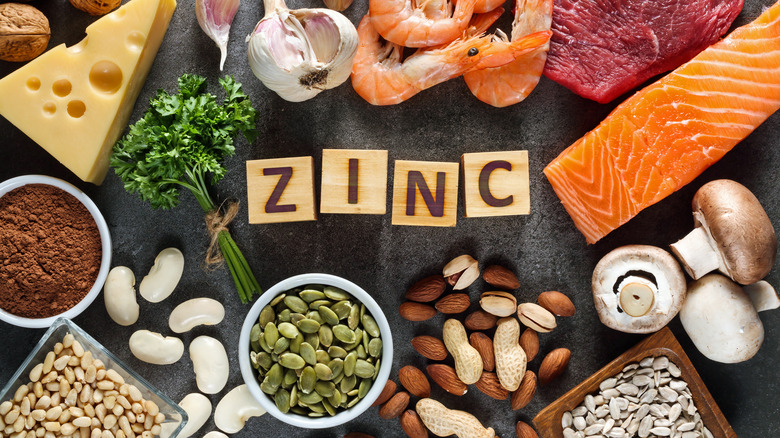How Much Zinc Do You Need To Get Every Day?
Zinc is an essential trace mineral the body needs for many functions, including wound healing, cell regeneration, and the development of DNA (via the National Institutes of Health Office of Dietary Supplements). Due to its ability to support the immune system, it also helps the body fight off viruses and defends against harmful bacteria. For pregnant women and children, zinc is particularly important. However, the recommended amount varies depending upon one's life stage.
According to a 2017 study published in the journal Nutrients, zinc has antioxidant and anti-inflammatory qualities. These health-promoting functions help protect against certain cancers, diabetes, and neurodegenerative diseases. Conversely, deficiencies of this vital mineral can mean bad news for the body. It can increase our vulnerabilities toward bacterial infections and sepsis, increase inflammation and oxidative stress, and hinder immune system homeostasis. Fortunately, there's specific guidance on how much zinc you need to stay healthy and ways to get more of it.
How to meet your daily zinc needs
If you eat a wide variety of fruits, vegetables, and meat, you may be getting enough zinc through your diet. So what exactly is the right amount? According to the National Institutes of Health Office of Dietary Supplements, adult men need 11 milligrams per day, and adult women need 8 milligrams. Pregnant women should increase their zinc intake and aim for 11 milligrams, and breastfeeding women need 12 milligrams.
While zinc deficiency in the U.S. is uncommon, it's more likely to occur in individuals with certain health conditions and dietary restrictions. For instance, those with digestive problems like Crohn's disease or ulcerative colitis might eat enough zinc-rich foods but can't absorb nutrients properly. Additionally, vegetarians and those who exclude meat may miss out on good sources of zinc that come from seafood and red meat. Fortunately, there are ways to bridge nutritional gaps by incorporating fortified foods and dietary supplements if needed (via National Institutes of Health Office of Dietary Supplements).


